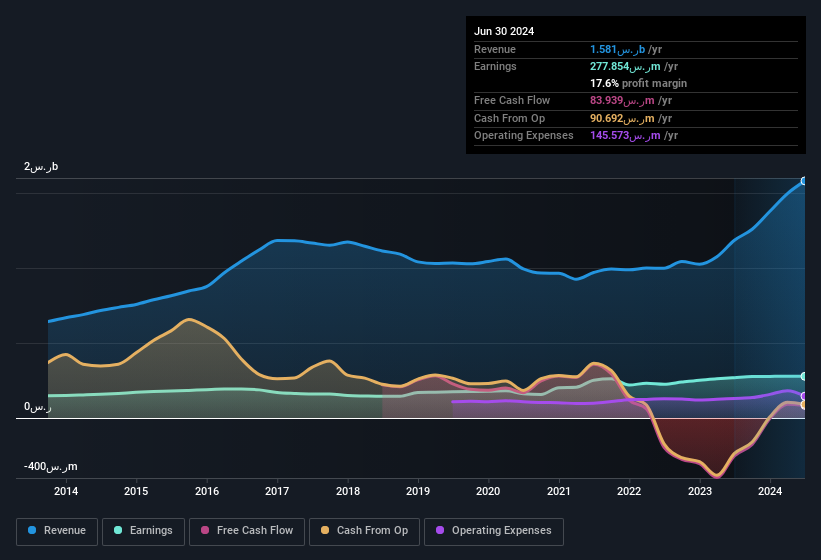- Saudi Arabia
- /
- Transportation
- /
- SASE:4260
United International Transportation's (TADAWUL:4260) Shareholders May Want To Dig Deeper Than Statutory Profit

The stock price didn't jump after United International Transportation Company (TADAWUL:4260) posted decent earnings last week. We think that investors might be worried about some concerning underlying factors.
Check out our latest analysis for United International Transportation

In order to understand the potential for per share returns, it is essential to consider how much a company is diluting shareholders. In fact, United International Transportation increased the number of shares on issue by 9.8% over the last twelve months by issuing new shares. That means its earnings are split among a greater number of shares. Per share metrics like EPS help us understand how much actual shareholders are benefitting from the company's profits, while the net income level gives us a better view of the company's absolute size. You can see a chart of United International Transportation's EPS by clicking here.
A Look At The Impact Of United International Transportation's Dilution On Its Earnings Per Share (EPS)
United International Transportation has improved its profit over the last three years, with an annualized gain of 10% in that time. And in the last year the company managed to bump profit up by 3.3%. But in comparison, EPS only increased by 3.4% over the same period. Therefore, the dilution is having a noteworthy influence on shareholder returns.
Changes in the share price do tend to reflect changes in earnings per share, in the long run. So it will certainly be a positive for shareholders if United International Transportation can grow EPS persistently. But on the other hand, we'd be far less excited to learn profit (but not EPS) was improving. For that reason, you could say that EPS is more important that net income in the long run, assuming the goal is to assess whether a company's share price might grow.
That might leave you wondering what analysts are forecasting in terms of future profitability. Luckily, you can click here to see an interactive graph depicting future profitability, based on their estimates.
Our Take On United International Transportation's Profit Performance
Each United International Transportation share now gets a meaningfully smaller slice of its overall profit, due to dilution of existing shareholders. Because of this, we think that it may be that United International Transportation's statutory profits are better than its underlying earnings power. Nonetheless, it's still worth noting that its earnings per share have grown at 10% over the last three years. The goal of this article has been to assess how well we can rely on the statutory earnings to reflect the company's potential, but there is plenty more to consider. So if you'd like to dive deeper into this stock, it's crucial to consider any risks it's facing. At Simply Wall St, we found 1 warning sign for United International Transportation and we think they deserve your attention.
This note has only looked at a single factor that sheds light on the nature of United International Transportation's profit. But there are plenty of other ways to inform your opinion of a company. For example, many people consider a high return on equity as an indication of favorable business economics, while others like to 'follow the money' and search out stocks that insiders are buying. So you may wish to see this free collection of companies boasting high return on equity, or this list of stocks with high insider ownership.
New: AI Stock Screener & Alerts
Our new AI Stock Screener scans the market every day to uncover opportunities.
• Dividend Powerhouses (3%+ Yield)
• Undervalued Small Caps with Insider Buying
• High growth Tech and AI Companies
Or build your own from over 50 metrics.
Have feedback on this article? Concerned about the content? Get in touch with us directly. Alternatively, email editorial-team (at) simplywallst.com.
This article by Simply Wall St is general in nature. We provide commentary based on historical data and analyst forecasts only using an unbiased methodology and our articles are not intended to be financial advice. It does not constitute a recommendation to buy or sell any stock, and does not take account of your objectives, or your financial situation. We aim to bring you long-term focused analysis driven by fundamental data. Note that our analysis may not factor in the latest price-sensitive company announcements or qualitative material. Simply Wall St has no position in any stocks mentioned.
About SASE:4260
United International Transportation
Engages in the leasing and rental of vehicles, and used car sales under the Budget Rent a Car name in Saudi Arabia.
Proven track record and fair value.
Similar Companies
Market Insights
Community Narratives




